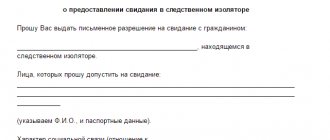For representatives of modern society, living in a civil marriage has become the norm rather than the exception. Partners do not want to formalize the connection legally for one reason or another or do not see the need for state registration. For many, registering a marriage means obligations and restrictions that they do not want to have. But if one of the partners commits a crime and is taken into custody, it turns out that only relatives or officially registered husband/wife have the right to visit him/her.
You can get married in a pre-trial detention center.
This right does not apply to brides/grooms, common-law wives/husbands. In such cases, cohabiting people are faced with the need to register their relationship in a pre-trial detention center. Those wishing to register a marriage within the pretrial detention center should be aware that the mere fact of legalizing the relationship does not affect the provision of visits with a person in custody, unless the judge or investigator gives permission.
Reasons for registering a marriage in a pre-trial detention center
The desire to marry a partner in a pre-trial detention center arises for a variety of reasons. In most cases, the initiators of marriage are women who wish to thus consolidate the relationship at the official level. In this way, girls and women want to prove the seriousness of their intentions towards their spouse who is in custody. In addition to the above reason, personal connections can be formalized in pre-trial detention centers if:
- a woman is expecting a child and wants the baby to have a legal father;
- difficult financial situation;
- the prospect of receiving an inheritance;
- desire to provide moral support to your cohabitant;
- the desire to legally assert one’s right to jointly acquired property;
- the desire to secure acquired property before trial in order to avoid confiscation;
- other reasons.
In this case, the option of celebrating a wedding is not considered, since the couple will not have time for it. As a rule, the wedding is celebrated after the offender has been released from the pre-trial detention center or places of deprivation of liberty. Whatever the motives, all problems associated with the process of legislative confirmation of the union fall on the shoulders of the free partner.
Where and how to get permission
Therefore, before entering into a marriage, you will need to contact an investigator or the court if the person arrested is registered with the specified authority. As practice shows, at this stage, problems usually do not arise, since there are no specific restrictions or prohibitions by law on the issue of formalizing family relationships in a pre-trial detention center.
Important! The person concerned, who is at large, must do the following:
- contact the investigator or the court with a request to give permission to register a marriage with a person who is in a pre-trial detention center. The appeal may be oral or written;
- if an oral appeal is refused, a written application must be submitted;
- a repeated refusal must be formalized by the investigator or the court in writing, indicating the reasons for such a decision. The refusal can be appealed to a higher official or to a higher court.
In practice, there are almost no cases of refusal to register a marriage with a person who is being held in a pre-trial detention center.
Reasons for refusal of registration
Desire alone is not enough to register a marriage with a person in custody. A request to register a marriage with a person in a pre-trial detention center may be refused if the head of the civil registry office has evidence of circumstances that make the conclusion of a union impossible in accordance with Art. 14 of the Family Code of the Russian Federation, namely:
- one of the partners is a member of a registered union;
- Close relatives, half or full sisters and brothers are planning to get married;
- it is planned to unite the adopted person and the adoptive parent;
- one of the persons suffers from a mental disorder.
There are no other circumstances provided for by law. The presence of foreign citizenship, lack of registration at the place of residence, religious beliefs, etc. cannot be obstacles to the legislative establishment of communication in this case.
Submitting a package of documents to the registry office
An application for marriage registration, filled out by the prisoner and certified by an official, is transferred to the second applicant. The convicted person’s petition can be sent by mail or received in person at the special unit of the colony.
Before contacting the registry office, the bride (groom) fills out the second part of the application. In addition, the management of the correctional organization issues a prisoner’s passport during the submission of documents.
Newlyweds who are at large have the right to register a family union in any branch of the registry office.
Registration of marriage relations with a prisoner is carried out only at the location of the correctional institution. The official checks the package of documents and determines the wedding day.
Setting a date. Registration period
The procedure for legal registration of marriage is enshrined in the Family Code of the Russian Federation (Chapter 13). According to the general rules, the wedding takes place no earlier than a month from the date of filing the application (Article 11 of the RF IC). It is possible to speed up the ceremony only if there are special reasons. The legislation includes pregnancy of the bride or a threat to the life of one of the future spouses as such circumstances.
One of the features of registering a relationship with a convicted person is the impossibility of freely choosing a wedding date. The registry office has predetermined the day on which travel to correctional institutions takes place.
Field registration includes the following steps:
- the “free” spouse issues a pass to the territory of the colony in advance;
- the administration of the penal colony or pre-trial detention center allocates premises;
- newlyweds sign documents;
- An employee of the civil registry office records the fact of marriage in the deed registration book.
The procedure takes no more than 30 minutes. Then the spouse who is under arrest returns to the cell. The newlyweds can exchange rings. However, wearing jewelry in prison is prohibited. Therefore, after the wedding, the prisoner gives his ring to his wife (husband).
What is the difference between weddings in a pre-trial detention center?
Marriage ceremonies are held in colonies, prisons, etc. But formalizing relationships in a pre-trial detention center has one significant difference: even a short date is unacceptable in this case. The whole process takes up to half an hour, including:
- a conversation between a registry office employee and the newlyweds to clarify their joint desire to formally consolidate the relationship;
- signing the necessary papers;
- photographing.
The newlyweds will not be left alone for a minute; at best, they will be allowed hugs and kisses in the presence of guards. In addition, ceremony participants cannot choose:
- the civil registry office conducting the ceremony;
- location;
- number of witnesses and participants of the event.
Those getting married have the right to invite a maximum of two people to the celebration. If the invitees wish to be present during the wedding, they must first obtain permission from the representative of the law involved in the criminal case (before the trial - from the investigator, during the trial - from the judge). The procedure for confirming the legality of a marriage relationship may be postponed to a later period if the accused or suspect is serving a disciplinary sentence in a punishment cell.
How to make an application
A person held in a pre-trial detention center who wishes to get married writes a statement addressed to the head of the institution, in which he indicates:
- position of the head, his rank, surname, initials, name and territorial affiliation of the institution of the Federal Penitentiary Service where he is detained;
- last name, first name, patronymic, passport details, status of the person submitting the application;
- the name of the document “Application for consent to register a marriage in a pre-trial detention center”;
- a request for a marriage registration procedure indicating the date of marriage, surname, first name, patronymic and other data of the second spouse;
- day, month, year of drawing up the document, signature, surname and initials of the arrested person.
If you plan to bring specific items to the pre-trial detention center for the wedding procedure, this must be additionally reflected in the text of the application. Typically, this procedure is agreed upon at a personal meeting with the head of the pre-trial detention center, which avoids the bureaucratic procedure of filing an application and obtaining the appropriate permit.
Attention! Our qualified lawyers will assist you free of charge and around the clock on any issues. Find out more here.
Features of the procedure
The procedure for registering marriage relations can be carried out:
- before trial;
- when the accused is on trial;
- at the end of the trial before being sent to prison or during the period after filing an appeal.
The actions that need to be taken to organize the legalization of communication are practically the same. The only difference is that, depending on the time of the marriage registration procedure, it is necessary to apply for permission to confirm the legality of the marriage from different officials.
Regardless of whether cohabitants wish to sign before the trial, during the trial or after the trial, their actions fall under paragraph 2 of Art. 26 of Law N 143-FZ “On acts of civil status”. The law states that if one of the persons is unable to jointly write statements at the registry office, it is allowed to submit separate applications to enter into an official union.
How is the procedure carried out in various MLSs?
The possibility of marriage does not depend on the place of imprisonment. But there are some individual characteristics.
In a pre-trial detention center, to submit an application, you need to contact the judge or investigator who is handling the prisoner’s case. In other cases, the application is written to the head of the prison or colony.
Also, in all correctional institutions, except for the pre-trial detention center, you can make a request for a three-day visit as a “honeymoon” . This is unacceptable in a pre-trial detention center, and the marriage registration procedure itself lasts no longer than 30 minutes, after which the defendant is taken back to his cell. In this case, the newlyweds will only be able to see each other on a regular date according to the general schedule. A defendant in a pre-trial detention center is allowed 2 visits per month.
The colony-settlement compares favorably with all other MLS regarding the ceremony. The prisoner can submit a request to register at the nearest registry office or village council, and invite an unlimited number of guests. In some settlements they even allow you to modestly celebrate the event in a local club. But this is discussed with management on an individual basis.
In other modes (general, strict, special) there are no special features. Even if the prisoner is kept in a strict or special regime colony under strict conditions of detention (there are also lighter conditions for good behavior), no difficulties should arise in registering a marriage from the point of view of the law . Provided, of course, that the convict is not violent and is not locked in a punishment cell every month.
Registration preparation stages
A prerequisite for official registration of relations with a person in custody is the presence of a passport. If there is no identification document, the wedding is impossible, and trying to prove anything in the courts is pointless. The procedure will have to be carried out only after the potential newlywed is released from the pre-trial detention center or after he is transferred to a colony, that is, after a court verdict.
The entire process of preparing and conducting registration is as follows:
- Obtaining special application forms at the registry office located next to the pre-trial detention center. If the forms are refused, complain to the prosecutor's office.
- Obtaining data for paying state fees.
- Visiting a notary (public, private) and concluding an agreement to travel to a pre-trial detention center.
- Obtaining permission to visit a person in custody (you should have your lawyer’s passport details with you). A lawyer can obtain permission independently.
- Departure of a legal specialist to the detention center for the prisoner to fill out part of the joint registration application. Certification of the prisoner's signature by a lawyer.
- You should go to the registry office with a statement certified by a notary and fill out the second side of the document in the presence of employees. Give the document to the registry office employees.
- Registration permit from the body conducting the criminal case (court or investigator). The document must indicate the details of the bride/groom and have a stamp (required). If the investigator refuses to issue a permit in the absence of motives, you should contact your superiors. A refusal may be that the accused or person under investigation is in a registered marriage, in a family relationship, is a person of the same sex as the applicant, etc.
- Submitting an application to the head of the pre-trial detention center at least a week before the procedure for legislative consolidation of the union. Served in a specific form. It is preferable to make an appointment with your boss and submit your application during the appointment.
- Prepare for the wedding on the specified date. You should know that keeping objects made of precious metals in pre-trial detention centers is prohibited, so it is better to take the ring with you after the celebration. The number of photographs that are allowed to be taken does not exceed 10.
Step-by-step instructions: how can I sign?
According to the second article 26 of Federal Law No. 143-FZ of November 15, 1997 “On Acts of Civil Status”, if one of the persons entering into marriage is unable to appear at the civil registry office to submit a joint application, the will of the persons, getting married, can be formalized in separate applications for marriage. This can be done in two ways - from the side of a prisoner or from a free person.
If the initiative belongs to the convicted person
- The prisoner must contact the administration of his correctional institution (if it is a pre-trial detention center, then the investigator). If the applicant has no disciplinary violations and is not being held in a detention center, then he is given a joint application form.
- Having agreed on a time with the administration, a notary arrives at the institution, in whose presence the prisoner fills out his part of the application.
- Next, you need to pay a state fee, without which the signature on the form will be considered invalid. Notary services are paid by the future spouses.
- Through the administration of the correctional institution, the party with whom the convict wants to marry is given an application form and information about which registry office to contact for registration.
- The registry office sets a registration date. This usually happens within a month. During this time, the future spouse, who is free, must obtain permission from the prison authorities or the investigator to visit the institution.
If the initiative belongs to a free person
- It is necessary to contact the registry office, which is located on the same territory where the correctional institution is located, to obtain a joint application form and a receipt for payment of the state fee.
- After the applicant signs the form, you need to find a notary. Before this, it is recommended to look at the market, since the price for the services of a notary willing to go to a pre-trial detention center or colony ranges from two to ten thousand rubles. Please note that the registry office may require copies of the application and documents, so this should be taken care of in advance.
- Next, you need to obtain permission to visit the correctional facility in person or through a notary.
- The notary comes to the prisoner to sign the second half of the application. Before doing this, do not forget to pay the state fee.
- Having received the signed form, you can take it to the registry office, which sets the registration date.
- After submitting the application, you need to contact the administration or investigator with a request to conduct the marriage.
This must be done at least five days before the registration date. Don’t forget to order a car for the registry office employee, who will take him to the appointed place and pick him up back.
Documentation
- A passport is the main document for registering a marriage. If the convicted person is in a pre-trial detention center, then make sure that the document is present in his file.
- Joint application form for marriage.
- Permission to register a marriage, signed by the administration of the correctional institution.
- Receipt for payment of state duty.
- A document confirming the divorce or death of a spouse, if one of the spouses was already married.
- A document authorizing marriage before reaching marriageable age if one or both persons are minors.
- If the prisoner is a foreigner, then it is necessary to obtain a certificate with a translation stating that there is no registered relationship. You can get it from a notary.
- If those getting married are under eighteen years of age, then they need written permission from their parents/guardian and documents confirming the need for marriage. For example, the bride's pregnancy.
How to make an application?
An application for permission to register a marriage is drawn up in the name of the head, and it is necessary to indicate the details of the correctional institution and the details of the prisoner: full name, residence address, passport details. Also, do not forget to indicate the passport details of your future spouse.
If the application is drawn up in a pre-trial detention center, then it is written in the name of the judge or investigator. The petition must indicate the expected date of the wedding and describe the items that the second person plans to bring with him to registration. The list of these items is discussed with the administration.
After three days you can check the status of your application. This is important, because without consent, a wedding is impossible. Please check with the staff that the passport will be in the room where the ceremony will take place at the appointed time.
State duty
The state duty is 350 rubles. To pay for it, you can use the government services website, online banking, or make payment through the registry office.
How is the procedure in MLS?
The wedding takes place in a separate room. Therefore, the bride or groom who is outside must obtain a pass to the territory of the prison or pre-trial detention center. The procedure is carried out by a civil registry office employee. The ceremony does not last long - 20-30 minutes.
As a rule, newlyweds have the right to invite two guests on each side , but this is discussed with the administration. Newlyweds are allowed to exchange rings, but the prisoner must give his ring to his partner, since metal objects are prohibited in prison.
You can order photography if among the convicts there is someone who wants to be a photographer. A staff member takes some photos for the prison newspaper. In some cases, a small tea party is allowed, but this depends on the authorities.
At the end of the ceremony, the prisoner is given a corresponding stamp in the marital status column of the passport. The partner will be given this stamp at the checkpoint, since he will have to leave his passport at the entrance to the correctional facility.
After registration, the prisoner and escort are taken to the interior premises. If the spouses have received the right to a long visit, then the “other half” is taken to the headquarters to wait for the paperwork for the long visit to be completed.
Differences from registration at liberty
- The event is held in a special room of the correctional institution.
- The number of guests is limited to two on each side.
- The registry office office is installed only at the location of the MLS.
- Notary services required.
- Limited time for honeymoon.
We must not forget that marriage to a prisoner can affect your career or the career of your relatives. Employees of the Ministry of Internal Affairs, lawyers, bank employees and government officials are prohibited from having relatives with criminal records.
Unfortunately, unions formed in prison often turn out to be short-lived. This happens for several reasons:
- The bride, who met her groom by correspondence, finds out that her lover turned out to be completely different from what she imagined.
- A marriage of convenience in which the spouses registered so that the prisoner had the opportunity to receive parcels.
- The selfish intention of the prisoner, who receives the right to long visits, the opportunity to receive parcels of food or cigarettes, as well as parcels with clothing and household supplies. Upon release, he can, at best, file for divorce, and at worst, disappear and not declare himself.
- When registering a marriage, the property of the spouses is divided in half, unless a marriage contract has been concluded. In this case, the prisoner can take advantage of the other half's naivety for personal gain.
Stipulated state duty
The amount of the state duty is determined by the relevant norm of the Tax Code and is only 350 rubles.
You can pay it in various ways:
- deposit cash at the cash desk of any bank that accepts payment for services, receiving a receipt with a note indicating that funds have been deposited into the account;
- go to the official website of State Services, select the appropriate option and make a payment;
- use Internet banking when paying state fees using a plastic card.
Watch the video. Wedding in a pre-trial detention center:
What can you bring to the celebration?
Marriage registration is allowed even for those convicted with the highest penalty - life imprisonment. Real examples have emerged of women finding ways to meet serial killers and achieving an eternal union with them.
It is difficult for a free person to imagine a wedding in prison, how registration is carried out. Television footage shows how beautifully, in accordance with the situation, the bride and groom are dressed with rings on their ring fingers. The availability of outfits, photographers and other nice little things depends on how the convict has proven himself during his time in prison. If there were no complaints and the boss is ready to provide the territory for the formalization of family ties, there will be no problems with the question of what needs to be purchased for a wedding in prison:
- dress or suit;
- rings;
- Food;
- passes for all participants.
Documentary set
No registration process can take place without papers. Subjects will have to collect evidence of legal facts:
- civil status;
- birth;
- ID cards.
The law requires the following documents to be presented to organize a wedding in prison:
- passports of those getting married - for prisoners they are kept in the custody of the administration of the correctional institution;
- an application completed and signed by both parties;
- for minors, permission from the court is required;
- receipts for payment of state fees.
The ceremony must take place without alcoholic beverages and other prohibited excesses, of which the administration will warn in advance. All participants are required to appear without signs of intoxication.
Required documents
The list of documents that are required to enter into marriage with a person held in a pre-trial detention center is no different from the documents that are provided to the registry office in a normal case, these are:
- personal passports of the spouses;
- if one of the future spouses was previously married, a divorce certificate will be required;
- if one of the spouses died, a death certificate must be submitted;
- receipt for payment of state duty.
It should be borne in mind that failure to submit a complete package of documents will result in refusal to accept the application for marriage. And the registry office employees will be right.
Please note! When concluding a marriage with a prisoner, the civil registry office official is obliged to check whether there are any grounds that prevent its conclusion.
Is there a solemn ceremony everywhere?
Such a process is possible in the most ideal dreams. Not everyone is allowed special clothes and long dates, and the rings are made of metal, and such products are not supposed to be taken into a closed area.
Ceremonial music, photographers and alcohol, even a glass of champagne, will not be allowed. The bride and groom can drop into the designated room for 5 minutes and quickly return to work. This is just enough time to sign the agreement.
Where does registration take place?
To carry out marriage registration for a person who is held in a pre-trial detention center and is also serving a sentence in a correctional colony, the head of the institution allocates a separate room. In it, the registry office employee carries out the procedure itself, in which future spouses, relatives, if they are admitted to the territory of the institution in the prescribed manner, participate, as well as the person responsible from the management of the institution.
Remember! For persons serving a sentence in a penal colony, marriage registration is carried out in the registry office, as for ordinary citizens.
Is marriage a mitigating circumstance?
A marriage that is registered in a pre-trial detention center or correctional colony is no different from a marriage that was registered between persons not associated with these institutions.
Marriage concluded in a pre-trial detention center:
- gives rise to family and civil law relations, as in the case when an ordinary wedding took place,
- appropriate changes are made to the passport,
- spouses are subject to the rules on jointly acquired property,
- All other norms of current legislation apply.
However, marriage will not be a mitigating circumstance. That is, marriage will not lead to early release from serving a sentence.
At the same time, the administration of the pre-trial detention center or penal colony, after completing the marriage registration procedure, is obliged to provide the spouses with a visit.
Watch the video. How to register a marriage:










